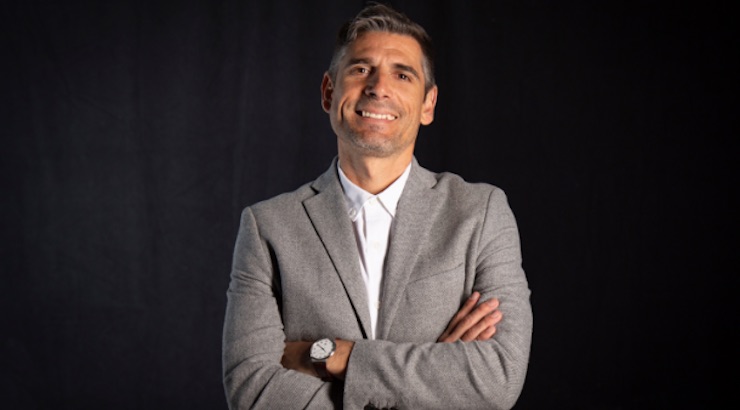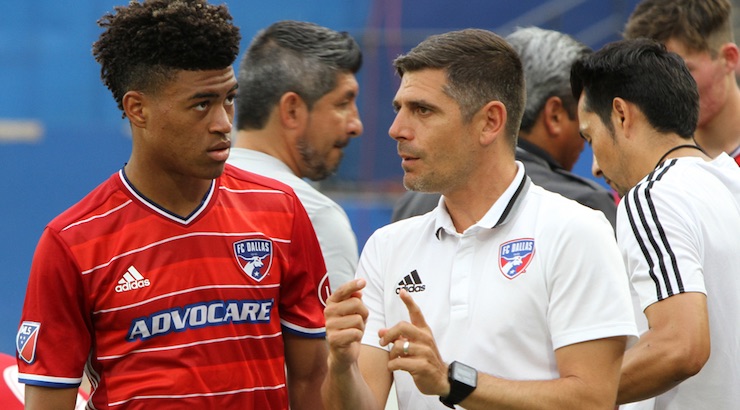FC Dallas’ Luchi Gonzalez Positive Approach: Youth Players Can Develop During The Pandemic
On a zoom call with Luchi Gonzalez and other media, head coach of FC Dallas urged players to make the most of this ‘downtime’ — those who use this time wisely can come out ahead of others … as this is a time kids can use to improve.
Former professional soccer player turned coach Luchi Gonzalez was a star youth player who grew up in the game. Now the head coach of MLS’ FC Dallas, Gonzalez is one of the most influential men in American soccer.

Formerly the FC Dallas Academy Director, Gonzalez took over as the club’s seventh head coach in 2018. Gonzalez is a player’s coach and a thinking man’s manager — astute, determined, insightful, and learned.
Interview with FC Dallas’ Luchi Gonzalez
Never one to waste time or opportunity, Gonzalez urges players to take advantage of this hiatus because of the Coronavirus COVID-19, find the opportunity to train and make the most of this time.
“This is a time for kids to improve.”
Luchi Gonzalez, FC Dallas head coach
“I am challenging my kids to be better — that is the mindset I have,” said FC Dallas head coach Luchi Gonzalez. “The players who are independent and want to touch the ball for hours … this opportunity can be huge.”
Read: FC DALLAS LUCHI GONZALEZ’S ADVICE TO PLAYERS
“This is an opportunity to learn ball mastery,” said Gonzalez. “The kids who have to wait to be told what to do may experience a harder time if they do not change their mindset but, we as parents, have the responsibility to model and push — I don’t know any six-year-old who loves their vegetables.”

Time is always precious and the Coronavirus COVID-19 pandemic, while a time of unprecedented uncertainty also affords us the time to reflect. This is an opportunity not to be wasted — a chance to emerge back on the soccer fields across America determined to be better than we were.
“The opportunity we have in youth is huge.”
Luchi Gonzalez, FC Dallas head coach
What needs to change to improve player development? According to Gonzalez, it is a shift in mentality, or in other words a conviction that our younger youth soccer players are as important to develop as our older players.
Read: FC DALLAS HEAD COACH LUCHI GONZALEZ ON PLAYING YOUNG PLAYERS
What do we need to do to improve youth soccer in America?
Gonzales believes it starts with deciding a youth soccer club’s U9s are just as important as their U17s. “We need to tell players not to punt balls fifty feet and bypass five players on their team,” said Gonzalez who believes comparing American U23s with their European counterparts is not overly useful. “Why don’t we compare ages where we can really control their pathway?” asks Gonzalez who believes it is wiser to compare 8-year-old players who have a trajectory that can be impacted.
“In the US, for us to have world-class players one day, the youth soccer clubs have to focus on the youngest ages; 6-year-olds, 7-year -olds and 8-year-olds.”
“I am not worried about the older age players — the question is what are we doing with the younger players? What formats are they playing? How are they being taught the game? How often are they training? What coaches do we have with these ages? These are the questions I think are the most important,” said Gonzalez.
Can young players keep training and improve during this hiatus of organized soccer?
Quick to point out that no 8-year-old is home alone during these Stay-At-Home days, Gonzalez said, “These kids can go play 1v1 with dad or mom, even if the parent has no idea of soccer, just dribbling around the adult can be of benefit for these young players.”

In addition to his advice for youth soccer players, the FC Dallas coach spoke highly of the accomplishments and contributions made by U.S. Soccer’s Development Academy — and agreed that America’s youth soccer clubs should be able to participate in solidarity payments.
Sharing in the player compensation money MLS clubs receive would be a game changer in youth soccer.
What are Solidarity Payments? According to the MLS FAQs on training compensation and solidarity payments: Under the FIFA Regulations, when a player registers as a professional for the first time in a country other than the one where he did his training, the club with which he registers is responsible for paying Training Compensation to every club that contributed to his training, starting from the season of his 12th birthday through the season of his 21st birthday.
Coming Soon: FC Dallas Luchi Gonzalez on Development Academy and the Challenges in Youth Soccer Today





